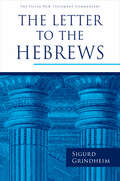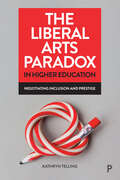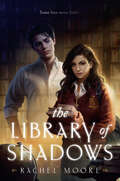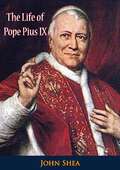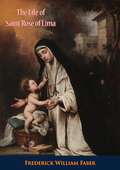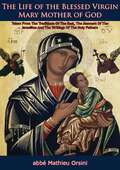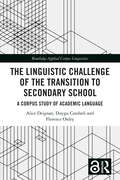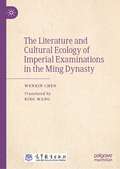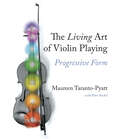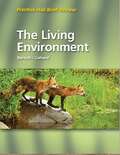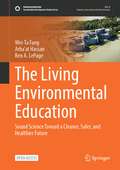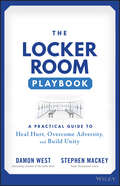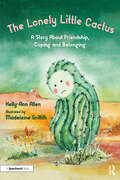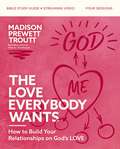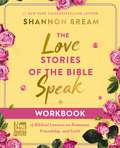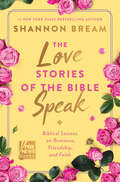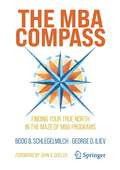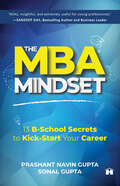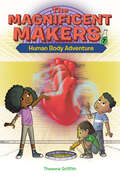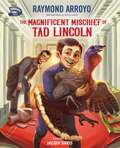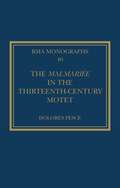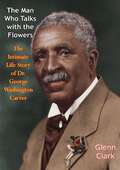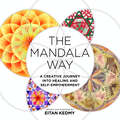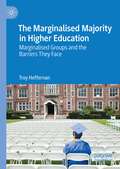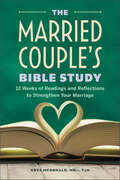- Table View
- List View
The Letter to the Hebrews (The Pillar New Testament Commentary (PNTC))
by Sigurd GrindheimWhat does the Letter to the Hebrews have to say to Christians today?A compelling exhortation to hold true to the faith in the face of adversity. A sermon rife with iconic imagery and Old Testament allusions. A signal work of theology in the New Testament.Above all, the Letter to the Hebrews proclaims the high priesthood of Jesus Christ. But the book&’s textual complexity and long history of interpretation can be overwhelming. In this new Pillar commentary, Sigurd Grindheim illuminates the Letter to the Hebrews, paying careful attention to linguistic features and historical context—all while centering its relevance to modern readers.Grindheim clearly and comprehensively addresses major issues about the text, including authorship, date, canonicity, formal qualities, and major themes. Following his thorough introduction, he explains each line of the text and its significance for believers today. Grindheim&’s commentary offers pastors, students, and scholars the clarity and fresh insights they want in their scriptural study.
The Liberal Arts Paradox in Higher Education: Negotiating Inclusion and Prestige
by Kathryn TellingThe liberal arts approach to higher education is a growing trend globally. We are told that the mental dexterity and independent, questioning spirit cultivated by such interdisciplinary degrees are the best preparation for the as-yet unknown executive jobs of tomorrow. This book explores the significant recent growth of these degrees in England in order to address an enduring problem for higher education: the relationship between meritocracy and elitism. Against the view that the former is a myth providing rhetorical cover for the latter, it argues that these are two entangled, but discrete, value systems. Sociology must now pay attention to how students and academics attempt to disentangle them.
The Library of Shadows
by Rachel MooreFunny, moving, and heart-achingly real, this romantic romp and paranormal romcom debut—through a haunted library with trapdoors, ghosts, and memories—is full of great love that triumphs over even death, perfect for fans of Ninth House and Cemetery Boys.Radcliffe Prep. The third most haunted school in the country, where a student disappearance isn’t uncommon and no one dares stay in the library after dark. And Este Logano enrolls with the hopes of finding her dead father.Not literally, of course. She doesn’t believe in ghosts. Going to her dad’s school just seems like her best hope at figuring out who he was.But then Este meets Mateo, who is maybe—probably—definitely—a real ghost. And an annoying one at that.When Mateo frames Este for the theft of a rare book from the library’s secret spire and then vanishes, Este will have to track him down or risk being expelled and leaving Radcliffe early just like her father did.Except following her father’s footsteps might be more dangerous than Este ever anticipated. As she investigates the library with its secret passageways, hidden tunnels, and haunted halls, she learns that the student disappearances aren’t just myth. And if she isn’t careful, she’ll be next.
The Life of Pope Pius IX: And The Great Events In The History Of The Church During His Pontificate
by John SheaFew events have been as impactful on the present-day circumstances of the Catholic Church as the Italian Unification. Pope Pius IX led the Church through a time of massive change in the political climates of Europe, ushering in the increase in visibility of the pope. Pius IX led the world in his strong attack against Modernism, and the increasingly secular cultures and economic systems which were engulfing the world.-Print ed.
The Life of Saint Rose of Lima
by Frederick William Faber Leonhard Hansen Jean Baptiste FeuilletTHE LIFE OF S. ROSE is translated from the French of Father Jean Baptist Feuillet, a Dominican friar, and Missionary Apostolic in the Antilles; the copy which has been followed is the third edition, published at Paris in 1671, the year of her canonization by Clement X.Rose of Lima (born Isabel Flores de Oliva; 20 April 1586 – 24 August 1617) was a member of the Third Order of Saint Dominic in Lima, Peru, who became known for both her life of severe penance and her care of the poverty stricken of the city through her own private efforts. Rose of Lima was born to a noble family and is the patron saint of embroidery, gardening and cultivation of blooming flowers. A lay member of the Dominican Order, she was declared a saint by the Catholic Church, being the first person born in the Americas to be canonized as such.As a saint, Rose of Lima has been designated as a co-patroness of the Philippines along with Pudentiana; both saints were moved to second-class patronage in September 1942 by Pope Pius XII, but Rose remains the primary patroness of Peru and of the local people of Latin America. Her image is featured on the highest denomination banknote of Peru.
The Life of the Blessed Virgin Mary Mother of God: Taken From The Traditions Of The East, The Manners Of The Israelites And The Writings Of The Holy Fathers
by Abbé Mathieu OrsiniTHIS book, received with such favour and indulgence by the public is not written through any vain desire of obtaining celebrity; it is a work of patience and of faith, a flower placed on the altar of Mary, with the simple heart of a pilgrim of the good old times. A better historian the Virgin undoubtedly deserved; but one more sincerely desirous to see her name glorified and her devotion extended she could not find.The history of the Queen of Angels, the mystical rose of the New Law, is a theme so poetical in itself that it naturally calls forth the most beautiful and refined ideas, as well as the most dignified expressions of language. It is an Oriental recital, reflecting the manners, the glories, and the sites of Asia; and so can it appear strange that the style should be impressed with an Eastern tint?
The Linguistic Challenge of the Transition to Secondary School: A Corpus Study of Academic Language (Routledge Applied Corpus Linguistics)
by Alice Deignan Duygu Candarli Florence OxleyThis book provides a unique analysis and description of the linguistic challenges faced by school students as they move from primary to secondary school, a major transition, which some students struggle with emotionally and academically. The study: • draws on a bespoke corpus of 2.5 million words of written materials and transcribed classroom recordings, provided by the project's partner schools; • combines quantitative and qualitative approaches to the corpus data to explore linguistic variation across school levels, registers and subjects; • describes the procedures of corpus compilation and analysis of written and spoken academic language, showing how modern corpus tools can be applied to this far-reaching social and educational issue; • uncovers differences and similarities between the academic language that school children are exposed to at primary and secondary school, contrasting this against the backdrop of the non-academic language that they encounter outside school. This book is important reading for advanced students and researchers in corpus linguistics, applied linguistics and teacher education. It carries implications for policymakers and schools looking to support students at this critical point in their schooling.
The Literature and Cultural Ecology of Imperial Examinations in the Ming Dynasty
by Wenxin ChenThe book examines the relationship between imperial examinations and literature from the perspective of restoring the cultural ecology of imperial examinations in Ming China, breaking through the paradigm of pure literature research. This book presents an important practice in adjusting the pattern of literary research. The contents of this book include five mutually independent but supportive parts: 1) the living conditions and careers of the literary attendants; 2) the educational background and school’s consciousness of the Ming literati; 3) top candidates and Ming literature; 4) genres of imperial examination and the Ming society; 5) exam cheating cases from the perspective of politics and literature. This book will appeal to readers interested in Chinese literature and culture and the imperial examination system in ancient China.
The Living Art of Violin Playing: Progressive Form
by Maureen Taranto-PyattBlending creative insights with wisdom of the masters, professional violinist Maureen Taranto-Pyatt shares practical guidance in her new methodology, Progressive Form.With The Living Art of Violin Playing, violinists will learn to appreciate the physics and geometry of movement to facilitate a nuanced flow of compression and release in the playing. A gradual building of technique begins from sitting or standing, moves through the torso into the left arm first, sets up an effective bow arm, and then combines the two in a holistic context. Imagery invigorates each of the technical moments, instilling new patterns that are now memorable and integrating each component into larger forms.Featuring nearly 400 photos and music examples to illustrate technical elements through balance and gesture, Progressive Form can be used as a step-by-step retooling of technique or as a reference for targeted issues. A comprehensive exploration of method in service of musical expression, The Living Art of Violin Playing offers the aspiring and serious violinist a path toward a more liberated musical world.
The Living Environment: Prentice Hall Brief Review for the New York Regents Exam
by John Bartsch Mary P. ColvardThe Living Environment: Prentice Hall Brief Review for the New York Regents Exam
The Living Environmental Education: Sound Science Toward a Cleaner, Safer, and Healthier Future (Sustainable Development Goals Series)
by Wei-Ta Fang Ben A. LePage Arba'at HassanThis open access book is designed and written to bridge the gap on the critical issues identified in environmental education programs in Asian countries. The world and its environments are changing rapidly, and the public may have difficulty keeping up and understanding how these changes will affect our way of life. The authors discuss various topics and case studies from an Asian perspective, but the content, messaging, and lessons learned need not be limited to Asian cultures. Each chapter provides a summary of the intensive research that has been performed on pro-environmental behaviors, the experience of people working in industry and at home, and their philosophies that guide them in their daily lives. We highlight humanity’s potential to contribute to Sustainable Development Goals (SDGs) by understanding better the environmental psychology, social inclusion, and environmental sustainability and stewardship protection elements that contribute to responsible environmental citizenship. The content of the chapters in this book includes a discussion of the crucial issues, plans, and evaluations for sustainability theories, practices, and actions with a proposed management structure for maximizing the cultural, social, and ecological diversity of Asian experiences compared to other theories and cultures internationally. We intend that the data in this book will provide a comprehensive guide for students, professors, practitioners, and entrepreneurs of environmental education and its related disciplines using case studies that demonstrate the relationship between the social and behavioral sciences and environmental leadership and sustainability.
The Locker Room Playbook: A Practical Guide to Heal Hurt, Overcome Adversity, and Build Unity
by Damon West Stephen MackeyDiscover how to achieve success together with this hands-on guide to the lessons found in The Locker Room In The Locker Room Playbook: A Practical Guide to Heal Hurt, Overcome Adversity, and Build Unity, bestselling author Damon West and player development coach Stephen Mackey teach you how to apply the principles and concepts found in The Locker Room. You&’ll find lists of core lessons, chapter summaries, detailed lesson breakdowns, discussion questions, exercises, and key takeaways in every chapter. You&’ll also discover: Insightful commentary on key concepts, including respect, loyalty, character, teamwork, prejudice, integrity, and mental health Crucial blueprints for helping athletes, professionals, and students learn how to navigate all aspects of their lives How to rely on your teammates, coaches, colleagues, leaders, and partners to achieve success togetherFilled with must-have team building and coaching resources, this book proves that there&’s always a path teams can take that allows them to work together. The Locker Room Playbook is your roadmap to finding that path and staying on it as you and your team work together to overcome adversity.
The Lonely Little Cactus: A Story About Friendship, Coping and Belonging (Building Belonging and PlayWorlds for Wellbeing)
by Kelly-Ann AllenFor effective use, this book should be purchased alongside the activity book, Conceptual PlayWorlds for Wellbeing: A Resource Book for the Lonely Little Cactus. Both books can be purchased together as a set, Building Conceptual PlayWorlds for Wellbeing: The Lonely Little Cactus Story Book and Accompanying Resource Book. The Lonely Little Cactus is a children’s picture story book about a cactus that feels lonely living in the desert. Through a series of colourful interactions with desert dwellers, the little cactus learns strategies to cope with feelings of loneliness. Both entertaining and educational, the story book is aimed at children aged 4-8 years old and spreads the message that loneliness is a common emotion that is manageable and can be overcome. It teaches children an array of coping strategies and encourages them to try various approaches to managing a difficult situation to find the strategies that best work for them. Offering a unique opportunity for children to learn about psychological strategies while being engaged in a beautiful narrative and visually captivating illustrations, this is the ideal resource for educators, support staff, practitioners and parents looking to help children understand and manage their feelings.
The Love Everybody Wants Bible Study Guide plus Streaming Video: How to Build Your Relationships on God’s Love
by Madison Prewett TrouttWhat if you've been looking for the wrong love in all the wrong places?Love is something we all want. We can&’t avoid it. But why is it so hard to find? What if it&’s because we&’re looking for the wrong love, in all the wrong places? And what if what we&’ve been believing about love is rooted in lies? What if the love everybody wants isn&’t nearly as complicated as we&’ve made it?In this four-session video Bible study, Madison Prewett Troutt breaks down the answer to your questions about love found in Jesus&’ great commandment in Matthew 22. You&’ll learn the simple truth that you must build your relationship with God first and that loving yourself and loving others well comes after. If you&’re tired of searching for love and coming up short, you&’re invited to join Madi in this study as she helps you discover the love you want is already yours—you just need to change whose love you&’re chasing.This study guide has everything you need for a full Bible study experience, including:Group discussion questions and activitiesIndividual access to four streaming video talks from MadiPersonal Bible study exercises, prayers, and journaling between sessionsChapter guide through Madi&’s bookA small group leader helps section with tipsSessions and video run times:Who and Why (19:00)Conviction and Confidence (22:30)Patterns, Purpose, and Peace (22:00)Stand Firm and Surrender (21:00)Watch on any device!Streaming video access code included. Access code subject to expiration after 12/31/2028. Code may be redeemed only by the recipient of this package. Code may not be transferred or sold separately from this package. Internet connection required. Void where prohibited, taxed, or restricted by law. Additional offer details inside.
The Love Stories of the Bible Speak Workbook: 13 Biblical Lessons on Romance, Friendship, and Faith
by Shannon BreamDiscover the wonders of God's unconditional love with this official workbook to the New York Times bestselling book, The Love Stories of the Bible Speak.The Bible takes us on a journey of discovering the many ways that God&’s unfailing love is expressed. This workbook—based on Shannon Bream's book—walks you through thirteen biblical lessons on love and its many forms, including romance, friendship, family, and faith. You'll:Explore stories of love found throughout the Bible.Get a front row seat into the many challenges these women and men faced.Be encouraged to renew your love for others and for God.Discover how God&’s love is often very different from ours, turning our assumptions about life, relationships, and each other upside down.Each lesson includes four parts:REFLECT—read key moments of each biblical relationship and see how the stories of characters in Scripture resemble your own experiences.CONNECT—consider how our Heavenly Father responds to our relational needs and design.REVEAL—identify ways we receive and offer love to others as well as receive and demonstrate love from God.PRAY—consider how the love stories throughout Scripture tie into how God is challenging and growing your relationships today.Together these Bible lessons remind us that we are designed to love and to be loved.
The Love Stories of the Bible Speak: Biblical Lessons on Romance, Friendship, and Faith (Fox News Books #7)
by Shannon BreamThe Bible is full of “love” stories. But the Biblical idea of love is so much bigger than we imagine. Love is at the heart of the Bible. From the moment Adam declared Eve “flesh of my flesh”…to the sacrificial love of Joseph for Mary…to the deep friendship of David and Jonathan…to the abounding and never-changing love of God: The Bible is a love story. But it also redefines the way the world tells us we should think about love.The Bible reveals not just butterflies and broken hearts. In Scripture, we see God’s beautiful design for the partnership of marriage. We witness friendships that cross all boundaries. We watch as families navigate the many seasons of life. Our guiding example for them all is the deepest, most abiding, foundational love ever known: God’s unconditional love for His people.In The Love Stories of the Bible Speak, Shannon Bream draws lessons from the good, the bad, and the ugly of Biblical romances, friendships, and families. She shows how God’s love is often very different from ours, turning upside down our assumptions about life, relationships, and each other.The Love Stories of the Bible Speak reminds us that, no matter where we find ourselves, God’s unwavering love will sustain and guide us. These insights into biblical relationships will uplift and encourage you, and reveal new dimensions to the most central Christian duty: to love God and your neighbor.
The MBA Compass: Finding Your True North in the Maze of MBA Programs
by Bodo B. Schlegelmilch George D. IlievLooking to pursue an MBA? The journey can be daunting, but fear not - this book is here to guide you every step of the way.With so many business schools and programs to choose from, it's important to know what you're looking for. That's where this book comes in. The authors help you understand the differences between full-time, modular, online, and executive MBAs, and provide expert advice on selecting the right program for your unique needs. But that's not all – the book also shows you how to make the most of your MBA experience, helping you to develop knowledge, skills, and personal growth. It explores the benefits of alumni associations and shows you how an MBA can be a game-changer for your career.And here's the best part - you don't need to spend a fortune on a Harvard or Stanford MBA to achieve your goals. The book introduces you to a range of high-quality MBA programs across the globe, from Europe to China, India to Latin America, that offer top-notch alternatives that won't break the bank.Whether you're a senior manager, entrepreneur, or fresh out of college, this book is the ultimate resource for anyone seeking to unlock their full potential with an MBA.
The MBA Mindset: 13 B-School Secrets to Kick-Start Your Career
by Prashant Navin GuptaElevate your B-school journey; transform your career Hundreds of thousands of students take admissions in business schools with a dream of creating a rewarding career. This dream often gets shattered because B-schools solely focus on providing business adroitness, often ignoring other critical skills. Moreover, students chase wrong goals, take unwise career decisions, and end up moulding a dissatisfying career filled with regrets. The MBA Mindset will enable you to optimise your B-school journey, extract maximum value from an MBA, and eventually build a fulfilling career. It will guide you towards the most critical steps in your MBA journey: • Nurturing your MBA aspirations and cracking the B-school admissions • Laying out a plan for your B-school journey • Selecting the apt MBA specialisation • Building a personal brand and networking effectively • Making the best use of internships, projects, and corporate competitions • Grabbing the best offers from your dream firm • Continuing to learn after graduating to achieve sustainable success This witty and informative compendium, scattered with real-life instances, will send you rolling on the floor laughing and help you craft a meaningful career during your B-school sojourn.
The Magnificent Makers #7: Human Body Adventure (The Magnificent Makers #7)
by Theanne GriffithBoom! Snap! Whiz! Zap! The Magnificent Makers is a fiction chapter book series filled with real science, adventure, and characters kids will love! Every book includes two science activities kids can do at home.A modern-day Magic School Bus for the chapter book reader!Pablo, Violet, and their new friend, Lorenzo, return to the Maker Maze for a science lesson about the human body! With new challenges in store, they get to learn all about the heart, lungs, and digestive system. But even though the Maker Maze is as fun as ever, Pablo seems a little annoyed with his friends' playful teasing.In Human Body Adventure, the kids remember that it's important to put themselves in others' shoes and to always be kind. Don't miss the other books in the series!#1: How to Test a Friendship#2: Brain Trouble#3: Riding Sound Waves#4: The Great Germ Hunt#5: Race Through Space#6: Storm Chasers
The Magnificent Mischief of Tad Lincoln (Turnabout Tales)
by Raymond ArroyoFrom New York Times bestselling author and news anchor Raymond Arroyo comes a fun picture book biography of Tad Lincoln, his relationship with his father President Abraham Lincoln, and a story about a parent&’s love for his son and the wisdom of a child. Full of humor, this romp through history will teach children about the power of curiosity, imagination, friendship, empathy, determination…and even a little mischief!Tad Lincoln was forever getting into trouble. He bounced around the White House making mischief and annoying almost everyone but the president. Yet Tad was his father&’s joy and comfort amidst a brutal war, a family tragedy, and the toll of holding the nation&’s highest office. When Tad befriends a turkey meant to be holiday dinner, his plea for the pet to be spared teaches Abe a lesson about mercy. It also starts the tradition of the presidential turkey pardon, a tradition that presidents carry on to this day.In The Magnificent Mischief of Tad Lincoln readers 4-8 will:learn about the larger-than-life personality of Tad Lincoln and his father President Abe Lincoln, highlighting the importance of familysee the impact of empathy and understanding towards othersbe inspired by Tad&’s resilience and determination, as he overcomes challenges learning to read and dealing with a speech impedimentenjoy Tad&’s mischievous and adventurous spirit, encouraging children to embrace their curiosity, explore new ideas, and make a difference in the lives of others by being themselves The Magnificent Mischief of Tad Lincoln includes:an annotated list of resourcesa fun history lesson about a favorite holiday traditionvibrant illustrations by artist Jacqui Davisan author&’s note by Raymond Arroyo, New York Times bestselling author of The Spider Who Saved Christmas Check out Raymond Arroyo&’s book The Unexpected Light of Thomas Alva Edison, also part of the Turnabout Tales series, which explores the hidden, pivotal moments that define some of history&’s greatest men and women.
The Malmariée in the Thirteenth-Century Motet (Royal Musical Association Monographs)
by Dolores PesceThis monograph offers a comprehensive study of the topos of the malmariée or the unhappily married woman within the thirteenth-century motet repertory, a vocal genre characterized by several different texts sounding simultaneously over a foundational Latin chant. Part I examines the malmariée motets from three vantage points: (1) in light of contemporaneous canonist views on marriage; (2) to what degree the French malmariée texts in the upper voices treat the messages inherent in the underlying Latin chant through parody and/or allegory; and (3) interactions among upper-voice texts that invite additional interpretations focused on gender issues. Part II investigates the transmission profile of the motets, as well as of their refrains, revealing not only intertextual refrain usage between the motets and other genres, but also a significant number of shared refrains between malmariée motets and other motets. Part II furthermore offers insights on the chronology of composition within a given intertextual refrain nexus, and examines how a refrain’s meaning can change in a new context. Finally, based on the transmission profile, Part II argues for a lively interest in the topos in the 1270s and 1280s, both through composition of new motets and compilation of earlier ones, with Paris and Arras playing a prominent role.
The Man Who Talks with the Flowers: The Intimate Life Story of Dr. George Washington Carver
by Glenn ClarkGeorge Washington Carver (1864-1943) was an American scientist, botanist, educator and inventor. Much of Carver's fame is based on his research into and promotion of alternative crops to cotton, such as peanuts and sweet potatoes. He wanted poor farmers to grow alternative crops both as a source of their own food and as a source of other products to improve their quality of life. The most popular of his 44 practical bulletins for farmers contained 105 food recipes that used peanuts. He also promoted about 100 products made from peanuts that were useful for the house and farm, including cosmetics, dyes, paints, plastics, gasoline, and nitroglycerin. In addition to his work on agricultural extension education for purposes of advocacy of sustainable agriculture and appreciation of plants and nature, Carver's important accomplishments also included improvement of racial relations, mentoring children, poetry, painting, and religion. He served as an example of the importance of hard work, a positive attitude, and a good education. His humility, humanitarianism, good nature, frugality, and rejection of economic materialism also have been admired widely. This is the story of Glenn Clark's friendship with Carver.-Print ed.
The Mandala Way: A Creative Journey into Healing and Self-empowerment
by Eitan KedmyWith gorgeous artwork, practical meditation exercises and accessible drawing guides, this is the only mandala book that offers a journey of self-discovery by showing how to create your own mandalas.Discover the power of mandalas with this drawing guide designed to help you look inward and give expression to your inner world of thoughts, feelings and experiences. Accessible for both artists and beginners, The Mandala Way acts as a gateway to the rich, multi-dimensional world of the mandala.Working your way through 16 mandalas, Eitan Kedmy offers an introduction, step-by-step line drawings, full-colour mandala art and a meditation for each mandala. The first eight lessons introduce you to basic templates, such as the Seed of Life and the Star of David. In the final eight lessons you will embark on a personal journey through the body&’s chakras:Sacral Chakra Mandala to help you feel more present. Heart Chakra Mandala to aid you in finding unconditional love within yourself.Throat Chakra Mandala to sharpen your self-expression. Combining creativity and fun with self-discovery and spiritual growth, the act of drawing mandalas helps to ease anxiety and insecurity, bring about clarity of thought and enhance our feelings of self-worth and self-confidence.
The Marginalised Majority in Higher Education: Marginalised Groups and the Barriers They Face
by Troy HeffernanThis book examines how the higher education sector has approached marginalised student and staff populations. The author highlights how universities were historically, and largely remain, the domain of the privileged, and demonstrates how institutions have implemented systems to enhance access for people marginalised because of their gender, race, sexual identity, disability and/or social class. These efforts have resulted in a numerical ‘marginalised majority’, but have not transferred to equity in terms of student grades, course completions and graduations, or marginalised academics’ chance of gaining continuing/tenured positions, streaming into a research rather than teaching-focused role, and the likelihood of reaching the professoriate or being selected for leadership positions. This examination is carried out through a Bourdieusian lens, which provides the ideal tool to illustrate how privilege manifests in higher education, and essentially taxes the efforts of those from marginalised backgrounds hoping to achieve equitable successes with their privileged peers. The book will be of interest to students and scholars in the fields of higher education administration and policy, and social justice in education.
The Married Couple's Bible Study: 12 Weeks of Readings and Reflections to Strengthen Your Marriage
by Krys McDonaldStrengthen your marriage through ScriptureAll marriages take effort and intention—and studying Scripture together can provide the guidance you need to thrive at every stage of your relationship. Whether you're going through a challenging time or just looking to grow even closer, this inspiring Bible study shows you how to make your relationship and your faith a priority. Over the course of twelve weeks, you'll deepen your bond with each other while ensuring that God remains at the center of your marriage. Created for busy couples—Carving out time for the Lord is easy; weekly studies consist of three scripture passages, reflective prompts, and prayers you can do together in 15 to 20 minutes. Explore common challenges—Find deeper meaning in God's Word with thoughtful commentary that speaks to issues all married couples face, from establishing good communication to remaining faithful.Lessons for life—Apply the Lord's teaching to your everyday life through engaging activities that ask you to celebrate each other, practice active listening, foster intimacy, and more. Grow closer to your spouse and to the Lord with The MarriedCouple's Bible Study .
